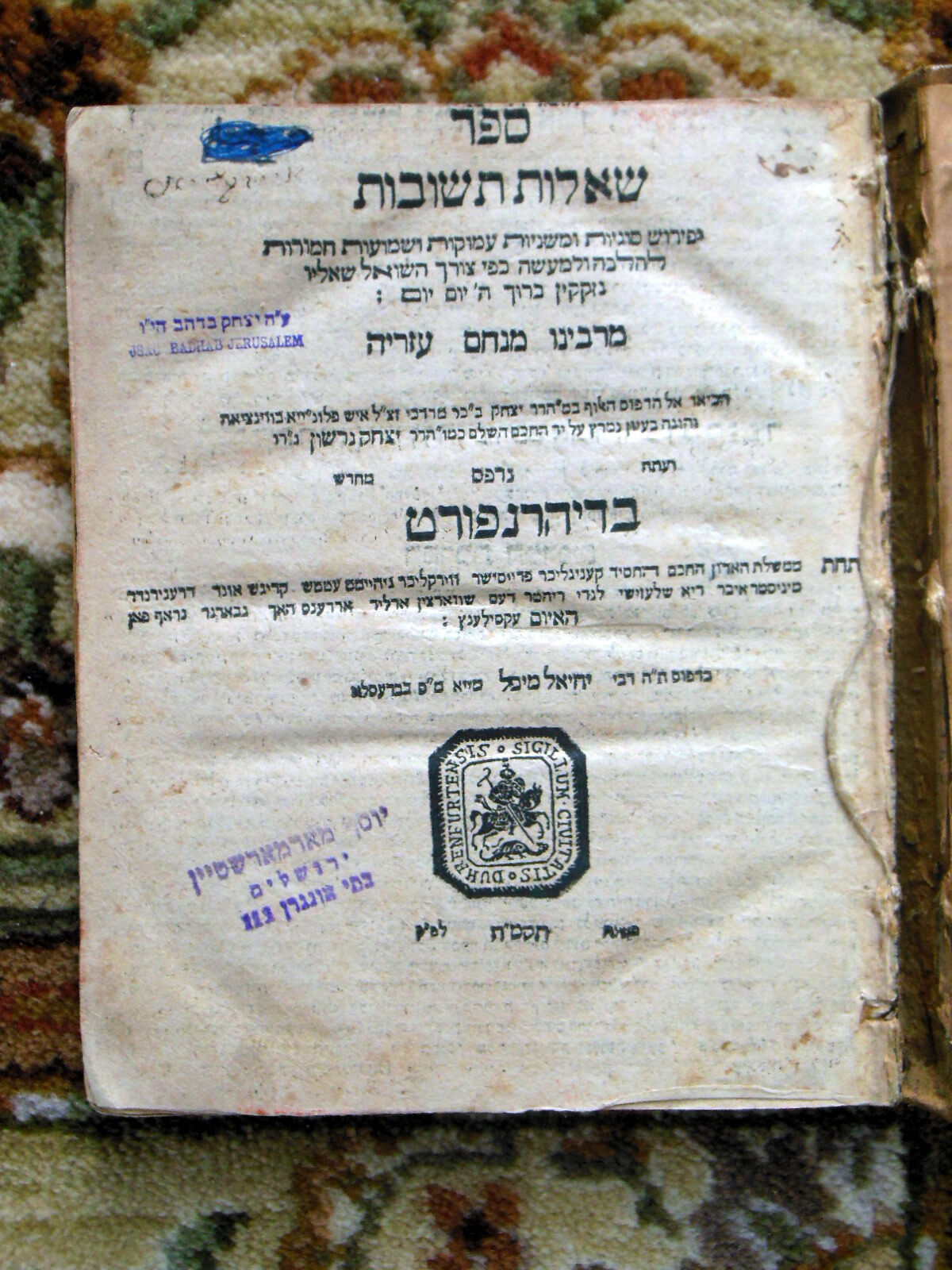1788 KABBALA RESPONSA CONTROVERSIAL RABBI MENAHEM AZARIAH DA FANO Hebrew-Aramaic

When you click on links to various merchants on this site and make a purchase, this can result in this site earning a commission. Affiliate programs and affiliations include, but are not limited to, the eBay Partner Network.
1788 KABBALA RESPONSA CONTROVERSIAL RABBI MENAHEM AZARIAH DA FANO Hebrew-Aramaic:
$325.00
RABBINIC RESPONSA by MENACHEM AZARIAH DA FANO, in HEBREW with some ARAMAIC.DYHERNFURTH (now Brzeg Dolny): 1788.Possibly the copy of ISAC BADHAB JERUSALEM, a noted Book Collector and Printer. There are 2 rubber ink stamps on the title page, both in Hebrew, one with a line of English that reads “JSAC BADHAB JERUSALEM”.Hardcovers, marbled paper covered boards and sheepskin covered spine, black embossed lettering on spine, 6” x 7.5”, 170 pages (85 numbered pages with only every other page being numbered). Engraved Printer’s device on the title page and a lovely engraved hunting woodcut at the end.Condition: The covers are rubbed, worn and scraped, leather corners missing, corners worn through; paper label on spine, nonetheless these early covers remain in one solid piece; internally, the front inner hinge is completely split, fully exposing the inner spine of the signatures; the rear inner hinge is hanging on, but a strong tug would pull the covers from the inner text block; the title page has two ink stamps as noted above, and a word or two that has been inked out, there may be blank prelims that are missing, text complete from the title page through the last page, the inner pages are evenly toned with age but remain clean, clear and fully legible; some pages have edge wear and corner creases but remain solid and well bound with their sewn binding.
SCARCE 1788 Dyhernfurth imprint of Rabbinic Responsa by Da Fano.About MENAHEM AZARIAH DA FANO (from Wikipedia):******Menahem Azariah da Fano (also called Immanuel da Fano, and Rema MiPano) (b. 1548, Fano-Mantua, d. 1620) was an Italian rabbi, Talmudist, and Kabbalist.Fano was a patron of learning. When Rabbi Joseph Caro, shortly before his death (1575), sent Kesef Mishneh, his commentary on Maimonides\' Yad ha-Ḥazaḳah, to Mantua for publication, Fano, at the suggestion of Dei Rossi, assumed part of the expense and took charge of the edition. According to a report of Immanuel Aboab, Fano lived for some time in Reggio Emilia. Numerous pupils flocked to him from Italy and Germany, and he was held in general respect for his learning and character.Fano\'s authority as a Talmudist is evident in a collection of responsa (\"She\'elot Teshubot me-Rabbi Menaḥem \'Azaryah,\" Dyhernfurth, 1788) containing 130 chapters on various subjects connected with religious law and ritual questions. They are distinguished by precision of style as well as by the author\'s independence of the later authorities. He even decides sometimes in opposition to Joseph Caro (e.g., No. 32), and holds changes in the ritual to be justifiable in certain cases (see, e.g., No. 25).******About RABBINIC RESPONSA (from Wikipedia):****** In rabbinic literature, the Responsa are known as She\'elot ve-Teshuvot (Hebrew: שאלות ותשובות \"questions and answers\") and comprise the body of written decisions and rulings given by poskim (\"deciders of Jewish law\").Judaism\'s responsa constitute a special class of rabbinic literature, to be distinguished from the commentaries (meforshim)—devoted to the exegesis of the Hebrew Bible, the Mishnah, the Talmud—and from the codes of law which delineate the rules for ordinary incidents of life.The responsa literature covers a period of 1,700 years—the mode, style and subject matter have changed as a function of the travels of the Jewish people and of the development of other halakhic literature, particularly the codes. See History of Responsa.Responsa play a particularly important role in Jewish law. The questions forwarded are usually practical, and often concerned with new contingencies for which no provision has been made in the codes of law, and the responsa thus supplement the codes. They therefore function as a source of law, almost as legal precedent, in that they are consulted by later decisions in their rulings; they are also, in turn, incorporated into subsequent codes.In addition to requests for Halakhic rulings, many of the questions addressed were theoretical in character, particularly amongst the earlier responsa. The responsa accordingly contain rulings on ethics, business ethics, the philosophy of religion, astronomy, mathematics, history, geography, as well as interpretations of passages in the Bible, the Mishnah, the Talmud and the Midrash. Thus, while early Jewish literature has few historical works, many notes on the history of Judaism have been introduced into the responsa.Responsa thus contain valuable information about the culture of the Jews and the people among whom they lived. Information may also be gleaned about the moral and social relations of the times, occupations, the household, customs, expressions of joy and of sorrow, and recreations and even games. Older responsa are also important for readings and emendations of the Mishnah and the Talmud.******
1788 KABBALA RESPONSA CONTROVERSIAL RABBI MENAHEM AZARIAH DA FANO Hebrew-Aramaic:
$325.00

Related Items:
1788 KABBALA RESPONSA CONTROVERSIAL RABBI MENAHEM AZARIAH DA FANO Hebrew-Aramaic
$325.00





